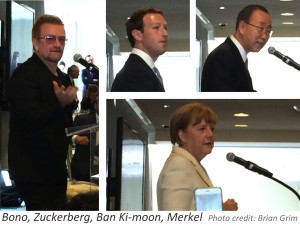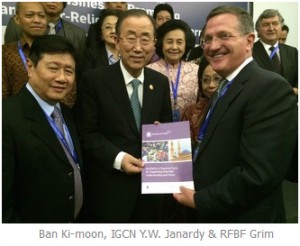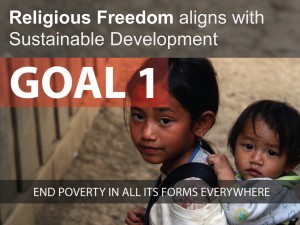 Brian J. Grim, President, RFBF
Brian J. Grim, President, RFBF
Following Pope Francis’ visit to the United Nations, I joined U2 rock star Bono, Facebook CEO Mark Zuckerberg, UN Secretary-General Ban Ki-moon, and German Chancellor Angela Merkel, together with and 350 business and private sector leaders to discuss how we can and already do promote the newly adopted sustainable development goals.
In his opening comments, the Secretary-General specifically called for increased private sector partnerships. For instance, the Religious Freedom & Business Foundation has partnered with the UN Global Compact’s Business for Peace platform to hold the Global Business & Interfaith Peace Awards during the 2016 Rio Olympic and Paralympic games. The Awards will recognize business leaders who are promoting interfaith understanding and peace – foundational elements of inclusive growth.
To see how business can be a powerful force supporting interfaith understanding and peace, see our joint publication which Secretary-General Ban Ki-moon helped launch last year together with the Indonesia Global Compact Network, led by Y.W. Junardy, who also attended the private sector forum.
UN Secretary-General Ban Ki-moon stated: “The United Nations has transformed its relationship with the private sector in the past decade and a half. Many Governments also support the complementary role that business can play to advance sustainable markets and build trust. Now I call for even stronger commitment to partnership, especially on our most pressing challenges. In the realm of peace and good governance, companies are taking actions that help – like fostering inter-religious understanding in the workplace and enacting zero tolerance policies on corruption.”
The forum, part of the UN Global Compact initiative, focused on the role of the private sector in implementing the Sustainable Development Goals, which were adopted on Friday and include a 15-year global plan of action to end poverty, reduce inequalities and protect the environment.
The meeting included CEOs committed to this vision from industries ranging from housewares giant IKEA – with its mission to make everyday life better – to AVIVA, the largest insurer in the UK with businesses across Europe, Asia and Canada – with its mission to be a good ancestor inspired by its own ancestors that set up the company in 1696.
Click here to see examples of what companies are doing to make the world a better place while making a profit.
 Religious Freedom, Poverty Alieviation & Sustainable Development
Religious Freedom, Poverty Alieviation & Sustainable Development
Religious freedom also addresses poverty, facilitating faith groups to join together to help the most vulnerable. Last week while I was in London, we saw significant progress toward piloting our Empowerment+ initiative, which links business and job training with interfaith spiritual principles that help people become self-reliant, contributing members of society. St. Mary’s University will work with the foundation to pilot it in East London, one of the UK’s most religiously and ethnically diverse neighborhoods.
Article 18 of the Universal Declaration of Human Rights defines Freedom of Religion or Belief (FoRB) as follows: “Everyone has the right to freedom of thought, conscience and religion; this right includes freedom to change his religion or belief, and freedom, either alone or in community with others and in public or private, to manifest his religion or belief in teaching, practice, worship and observance.”
An oft used definition for Sustainable Development is: “Development that meets the needs of the present without compromising the ability of future generations to meet their own needs” (Our Common Future, Oxford University Press, 1987).
So, what might be the connection between these seemingly very different concepts? The Religious Freedom & Business Foundation is publishing a new series of analysis and data on the connection between religious freedom and sustainable development.
Related articles




